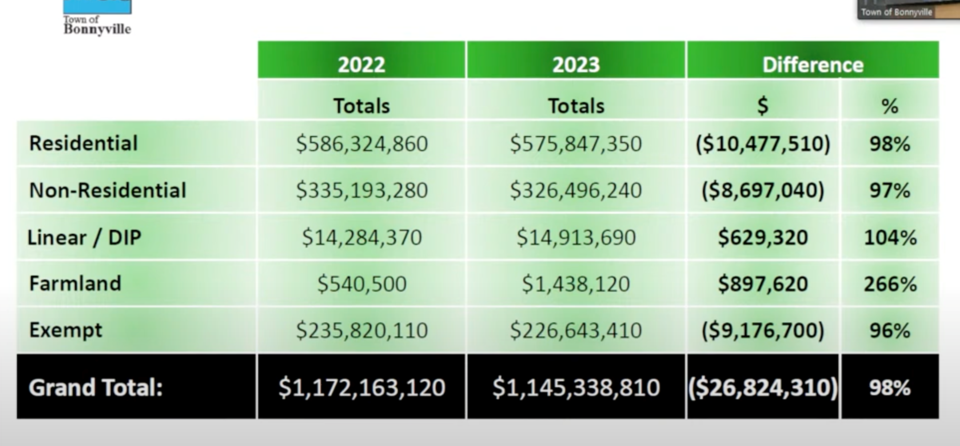BONNYVILLE – The Town of Bonnyville will once again see a slight decrease in property assessments.
Bob Daudelin with Accurate Assessments was on hand to speak with the Town of Bonnyville council on March 26, offering a slideshow presentation that went over assessments within the municipality.
When comparing 2022 to 2023 assessments, the Town of Bonnyville will see a two per cent decrease in overall assessment. Residential assessments decreased by two per cent, non-residential assessments decreased by three per cent, and linear assessments increased by four per cent.
While the numbers show a dramatic increase in farmland assessments, this is due to changes in legislation. Now, if there is a particular instance where farmland is adjacent and zoned industrial or commercial, it could warrant a full market value assessment. But it is still coded as farmland.
The effect on the property is the applied mill rate, come tax time.
Showing a graph that compares the total assessment over the last few years, a bit of a decrease has been noted when compared to the year prior, which previously showed an upward trend, heard council.
The vast majority of properties in Bonnyville will experience a -1 per cent to -10 per cent decrease in assessment. About 68 per cent of properties in town will see a decrease in value between $1,000 and $25,000, and just over 40 per cent of properties will decrease in value by $1,000 to $9,999.
In 2023, there was a net change of two new accounts, which means there was “very little growth” in new accounts, which typically means “there isn’t a whole lot of demand... it could allude to that,” said Daudelin.
A total of 114 development permits were applied for in 2023, which is in the lower to mid-range of the five-year trend.
There was evidence this year that residential land decreased in value, which varies by location,
“Now, this isn’t necessarily a specific circumstance to Bonnyville. I’ve seen this as well to a greater degree in the Town of St. Paul, and as well to the Town of Rocky Mountain House,” said Daudelin.
He noted there is likely either a surplus of land in some instances, or the demand isn’t there anymore and people do not want to hold the overhead year-after-year, and they are selling land for less.
General commercial land saw an 11 per cent to 12 per cent decrease, which speaks specifically to “downtown commercial” properties, rather than highway commercial properties. Overall Improved for general commercial properties decreased by two to three per cent.
Highway commercial land saw minimal change, and highway commercial overall improved properties saw a two to four per cent decrease.
For industrial properties, land saw a one to three per cent decrease, and overall improved saw a two to three per cent decrease, “which is really minimal if we look at the last six years,” said Daudelin.
Lots of foreclosures
Mayor Elisa Brosseau asked about the number of foreclosures in the community, and if that brings the value of properties down.
“I can never tell you for certain why the market does what it does,” said Daudelin. But he could speculate that there are certain aspects – such as interest rates and the cost of construction – that can affect things.
The Town of Bonnyville has the highest number of judicial sales/foreclosures/bank repossessions over the last three years, and the highest number of bank sales, when compared to the 11 communities Daudelin works with.
Between July 2020 and June 2023, 34 bank repossessions and 48 bank sales took place.
The banks shoot for what they should sell the property for, according to market value, but often it is five to 10 per cent lower than “what the property should be worth,” said Daudelin.
Typical there would be three to eight judicial sales/foreclosures in a community the size of Bonnyville. Daudelin noted that a similarly sized town he works with saw five repossessions and three bank sales in the same period.
Daudelin noted that when properties sell for less than expected, it does drive a certain perception and people are prone to wait for a better deal.
Inquiries
“Every property is reassessed annually,” said Daudelin, although they are not necessarily reinspected annually. It is mandated as a best practice to reinspect a property every five years, but Accurate Assessment does a four-year cycle for residential properties, which is above and beyond recommendations.
If a property owner has an assessment inquiry, they are encouraged to contact the municipality or attend an open house to speak to an assessor.
If, after all information has been gathered, a formal assessment complaint can be filed, explained Daudelin.



